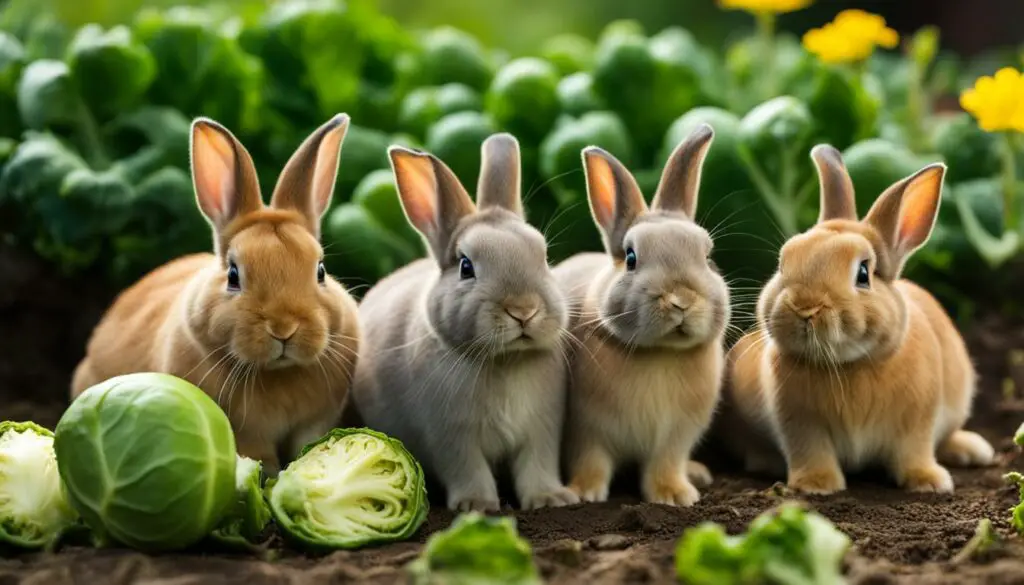As a rabbit owner, one of the most important aspects of caring for your furry friend is ensuring they have a proper diet. While hay is a staple in a rabbit’s nutrition, it’s essential to explore other safe and nutritious foods they can enjoy. One question that often comes up is whether rabbits can eat Brussels sprouts. Let’s dive into this delightful bunny diet guide to find out!
Key Takeaways:
- Brussels sprouts can be a safe option for rabbits, but introduce them slowly and watch for any adverse reactions.
- Brussels sprouts are rich in vitamins and minerals that benefit a rabbit’s overall health.
- Monitor portion sizes and avoid overfeeding Brussels sprouts to rabbits as they should only make up a small part of their diet.
- If your rabbit doesn’t like Brussels sprouts or experiences digestive issues, there are plenty of other nutritious vegetables they can enjoy.
- Consult with a veterinarian if you have any concerns or notice any health problems after feeding Brussels sprouts to your rabbit.
Yes! Rabbits Can Eat Brussels Sprouts
Rabbits can safely consume Brussels sprouts as part of their diet. These leafy green vegetables belong to the cabbage family and are packed with essential nutrients. However, it’s important to introduce Brussels sprouts slowly and monitor your bunny’s individual response. Not all rabbits tolerate Brussels sprouts well, so it’s crucial to pay attention to their preferences and any signs of digestive discomfort.
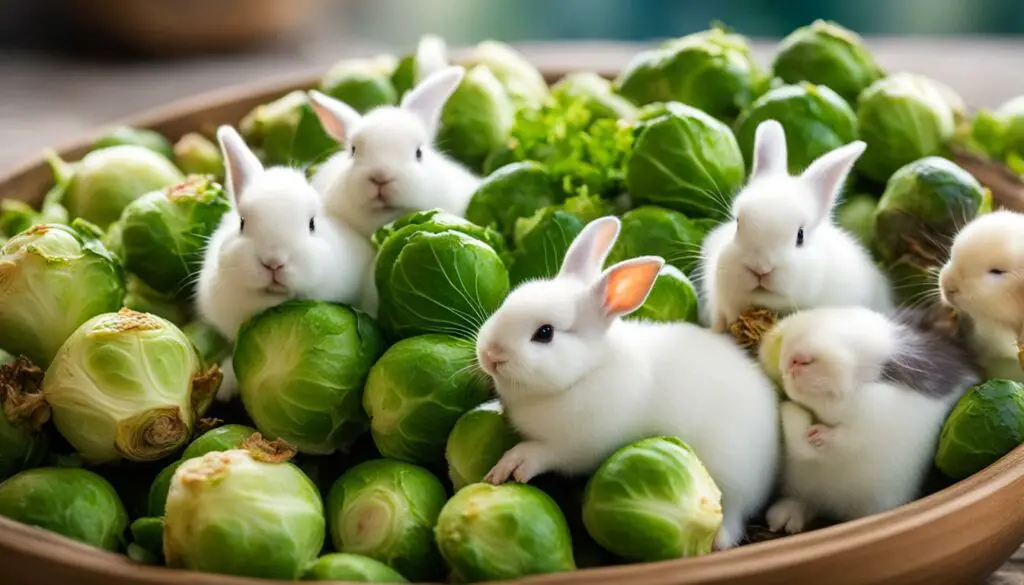
When feeding Brussels sprouts to your rabbit, start with small quantities and gradually increase the portion size. This will allow their digestive system to adjust and minimize the risk of bloating or other digestive disturbances. It’s recommended to offer Brussels sprouts as an occasional treat rather than a daily part of their diet. Variety is key in a rabbit’s nutrition, so be sure to provide other safe and nutritious vegetables to ensure a balanced intake of nutrients.
While Brussels sprouts can be a healthy addition to a rabbit’s diet, it is essential to be aware of potential risks. Some rabbits may not enjoy the taste of Brussels sprouts, while others may experience gas or bloating due to the high fiber content. Additionally, Brussels sprouts contain oxalates and isothiocyanates, which can be toxic to rabbits in large amounts. Therefore, moderation is crucial when feeding Brussels sprouts to your furry friend.
Brussels Sprouts Nutrition and Health Benefits
Brussels sprouts are packed with essential nutrients that can greatly benefit a rabbit’s health. These small green vegetables are rich in iron, potassium, thiamin, and vitamins A, B6, and K, making them a valuable addition to a bunny’s diet.
The iron in Brussels sprouts promotes the production of red blood cells and helps prevent anemia in rabbits. Potassium supports proper organ function and helps maintain a healthy metabolism. Thiamin is essential for nerve and muscle function, while vitamins A and B6 contribute to growth and development. Vitamin K is crucial for blood clotting and bone strength in rabbits.
In addition to these vitamins and minerals, Brussels sprouts are also high in fiber. Fiber is essential for a rabbit’s digestive health, helping to maintain optimal gut function and prevent gastrointestinal issues. Including Brussels sprouts in a rabbit’s diet can help promote regular bowel movements and prevent constipation.
It’s important to note that while Brussels sprouts offer numerous health benefits, they should be fed in moderation. Too many Brussels sprouts can cause digestive disturbances in rabbits, leading to bloating and gas. Additionally, some rabbits may simply not enjoy the taste of Brussels sprouts, so it’s always best to introduce them slowly and observe how your bunny responds.
Other Nutritious Vegetables for a Bunny’s Diet
In addition to Brussels sprouts, there are many other vegetables that can provide a balanced diet for rabbits. Carrots, celery, parsley, kale, collard greens, dandelion greens, and mustard greens are all safe and nutritious options. Offering a variety of vegetables ensures that your rabbit receives a range of essential vitamins and minerals.
| Vegetable | Nutrients | Benefits |
|---|---|---|
| Carrots | Vitamin A, fiber | Supports eye health, aids digestion |
| Celery | Vitamin K, water content | Hydrating, promotes blood clotting |
| Parsley | Vitamin C, antioxidants | Boosts immune system, supports kidney health |
| Kale | Vitamin C, calcium | Strengthens bones, aids in collagen production |
| Collard greens | Iron, fiber | Supports circulation, aids digestion |
| Dandelion greens | Vitamin A, calcium | Promotes healthy skin and fur, aids bone health |
| Mustard greens | Vitamin K, fiber | Supports blood clotting, aids digestion |
Remember to introduce new vegetables gradually and monitor your rabbit for any adverse reactions. Providing a varied and nutrient-rich diet will help ensure the overall health and well-being of your furry friend.
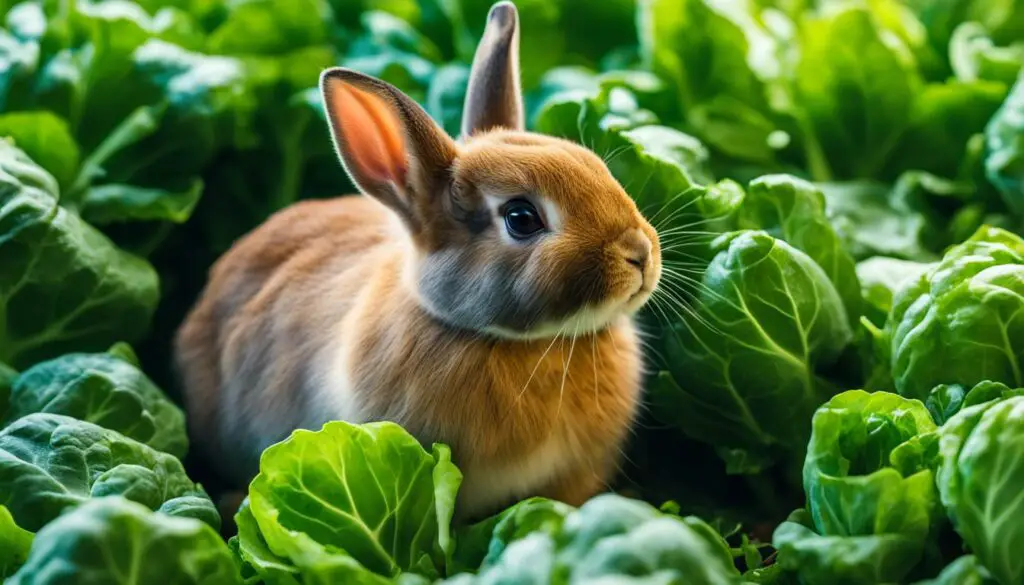
Precautions When Feeding Brussels Sprouts to Rabbits
While Brussels sprouts can be a beneficial addition to a rabbit’s diet, it’s important to take certain precautions when feeding them. Firstly, it’s crucial to introduce Brussels sprouts slowly and in small quantities to avoid any adverse reactions. Some rabbits may experience bloating and gas when consuming Brussels sprouts due to their sulfurous nature. These digestive disturbances can be harmful if not addressed.
Additionally, not all rabbits may enjoy the taste of Brussels sprouts. Just like humans, rabbits have individual preferences when it comes to food. It’s important to observe your rabbit’s reaction to Brussels sprouts and respect their likes and dislikes. If your rabbit shows signs of disinterest or refuses to eat Brussels sprouts, it’s best to offer them other safe and nutritious vegetables instead.
Furthermore, it’s essential to monitor your rabbit’s digestion when feeding them Brussels sprouts. While some rabbits can digest Brussels sprouts without any issues, others may be more sensitive. Keep an eye out for any signs of indigestion, such as diarrhea or changes in appetite. If you notice any digestive problems, it’s recommended to reduce or eliminate Brussels sprouts from your rabbit’s diet and consult with a veterinarian.
| Precautions When Feeding Brussels Sprouts to Rabbits: |
|---|
| Introduce Brussels sprouts slowly and in small quantities |
| Monitor your rabbit’s reaction and respect their preferences |
| Watch for signs of digestive distress and consult a veterinarian if needed |
How to Safely Feed Brussels Sprouts to Your Rabbits
When it comes to feeding Brussels sprouts to your rabbits, it’s important to follow some guidelines to ensure their safety and well-being. Here are some tips on how to safely incorporate Brussels sprouts into your rabbit’s diet:
1. Start slowly and monitor their response
Introduce Brussels sprouts to your rabbits’ diet gradually, starting with small amounts. This allows their digestive system to adjust and helps prevent any potential gastrointestinal discomfort. Monitor their response closely for any signs of bloating, diarrhea, or indigestion. If you notice any adverse reactions, it’s best to discontinue feeding Brussels sprouts and consult a veterinarian.
2. Offer a variety of brussels sprouts
There are different types of Brussels sprouts available, including green and purple varieties. Offering a variety of colors can provide a more diverse range of nutrients for your rabbits. Remember to always choose fresh, organic Brussels sprouts to avoid pesticides or other chemical contaminants. Wash them thoroughly before feeding to remove any dirt or bacteria.
3. Serve them in appropriate portions
Consider the size of your rabbits when determining the portion size of Brussels sprouts. Smaller rabbits may only need one or two Brussels sprouts per serving, while larger rabbits may require more. It’s important not to overfeed Brussels sprouts or any other green leafy vegetables, as they should only make up a small percentage of your rabbit’s overall diet.
By following these guidelines, you can safely incorporate Brussels sprouts into your rabbit’s diet and provide them with a nutritious and varied menu. Remember to prioritize their health and well-being, and always consult with a veterinarian if you have any concerns or questions.
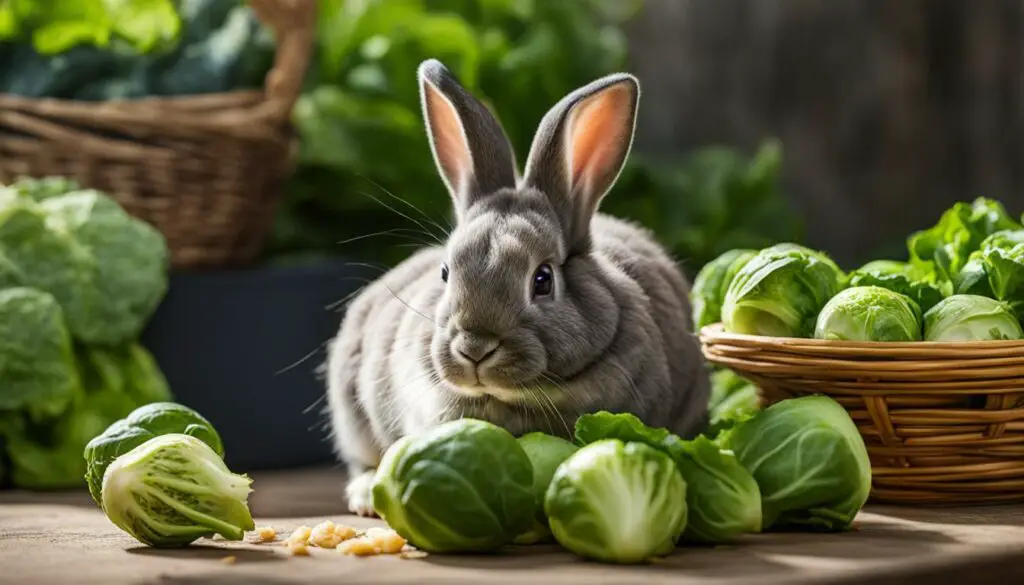
| Type of Brussels Sprouts | Nutritional Content |
|---|---|
| Green Brussels Sprouts | High in vitamins A, C, and K, as well as fiber and folate |
| Purple Brussels Sprouts | Rich in antioxidants and anthocyanins |
| Organic Brussels Sprouts | Free from pesticides and chemical contaminants |
Proper Portion Sizes for Brussels Sprouts
When it comes to feeding Brussels sprouts to rabbits, it’s important to consider the proper portion sizes. The amount of Brussels sprouts a rabbit can consume depends on its size. For smaller rabbits, one Brussels sprout may be sufficient, while larger or giant rabbits can eat larger portions without any adverse effects.
It’s crucial not to overfeed Brussels sprouts or any other green leafy vegetables to rabbits. These should only make up a small percentage of their overall diet. While Brussels sprouts do offer nutritional benefits, it’s important to provide a well-balanced diet that includes a variety of other vegetables.
Monitoring your rabbit’s diet closely is key to ensuring they receive the proper nutrition and avoid any digestive issues. If you’re unsure about the ideal portion size for your rabbit, consult with a veterinarian who can provide personalized guidance based on your rabbit’s specific needs.
| Rabbit Size | Brussels Sprouts Portion |
|---|---|
| Small | 1 Brussels sprout |
| Medium | 1-2 Brussels sprouts |
| Large or Giant | 2 or more Brussels sprouts |
Remember, moderation is key when it comes to feeding Brussels sprouts to rabbits. By providing the appropriate portion sizes and offering a diverse range of vegetables, you can ensure your rabbit’s diet remains healthy and balanced.
Alternatives to Brussels Sprouts for Rabbit’s Diet
If you’re looking for alternatives to Brussels sprouts, there are many other safe and nutritious vegetables that rabbits can enjoy. Adding variety to your rabbit’s diet is important to ensure they receive a balanced intake of nutrients. Here are some alternatives to consider:
- Carrots: Carrots are a popular choice for rabbits and are high in beta-carotene, which helps with vision and immune function.
- Celery: Celery is a crunchy and hydrating vegetable that rabbits often enjoy. It’s low in calories and a good source of vitamins and minerals.
- Parsley: Parsley is a flavorful herb that rabbits can eat in moderation. It contains vitamins A, C, and K, as well as antioxidants.
- Kale: Kale is a leafy green vegetable that is packed with vitamins and minerals. It’s a nutritious option for rabbits, but should be fed in moderation due to its high calcium content.
- Collard Greens: Collard greens are another leafy green vegetable that rabbits can enjoy. They are a good source of vitamins A and K, as well as fiber.
- Dandelion Greens: Dandelion greens are safe for rabbits to eat and are a good source of vitamins A and C. Just make sure they are free of pesticides.
- Mustard Greens: Mustard greens are leafy greens that are safe for rabbits to consume. They are rich in vitamins A, C, and K, as well as fiber.
Remember to introduce new vegetables slowly into your rabbit’s diet to monitor their response and avoid any digestive upsets. Offer a variety of vegetables to ensure a well-rounded diet for your furry friend.
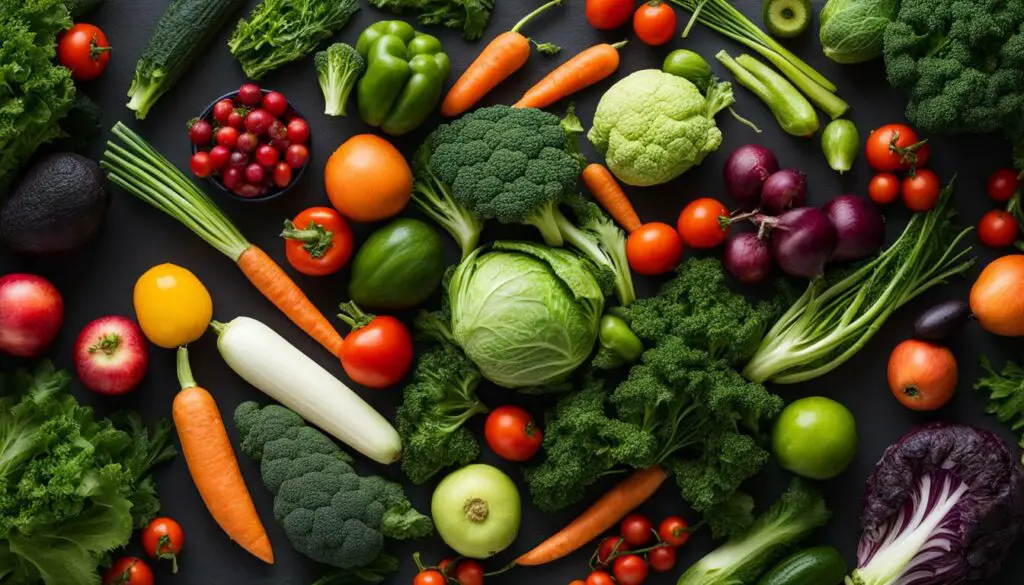
Table: Nutritional Comparison of Brussels Sprouts and Alternative Vegetables
| Vegetable | Protein | Fiber | Vitamin A | Vitamin C | Vitamin K |
|---|---|---|---|---|---|
| Brussels Sprouts | 3.4g | 3.8g | 754 IU | 75 mg | 177 mcg |
| Carrots | 0.9g | 2.8g | 10,333 IU | 6.1 mg | 13.2 mcg |
| Celery | 0.7g | 1.6g | 494 IU | 3.1 mg | 29.6 mcg |
| Parsley | 2.0g | 2.0g | 5054 IU | 133 mg | 164 mcg |
| Kale | 4.3g | 2.6g | 10,302 IU | 120 mg | 547 mcg |
| Collard Greens | 3.0g | 2.8g | 3333 IU | 35 mg | 440 mcg |
| Dandelion Greens | 2.7g | 3.5g | 5,429 IU | 35 mg | 778 mcg |
| Mustard Greens | 2.9g | 3.2g | 2,562 IU | 70 mg | 279 mcg |
Tips for Introducing Brussels Sprouts to Your Rabbit’s Diet
When it comes to introducing Brussels sprouts to your rabbit’s diet, there are a few important tips to keep in mind. First, start with small amounts and gradually increase the portion size over time. This allows your rabbit’s digestive system to adjust to the new food without causing any upset. It’s also crucial to thoroughly wash the Brussels sprouts before feeding them to remove any dirt or bacteria that could be harmful to your rabbit’s health.
You have the option of serving Brussels sprouts raw or lightly steamed. Both methods are safe and retain the beneficial nutrients found in these vegetables. However, be sure not to overcook the sprouts, as this can result in nutrient loss. Keep in mind that some rabbits may have a preference for either raw or cooked Brussels sprouts, so it can be helpful to experiment and see which option your furry friend enjoys more.
Monitoring your rabbit for any signs of digestive upset is essential. If you notice any bloating, diarrhea, or indigestion after feeding Brussels sprouts, it may be a sign that your rabbit has difficulty digesting them. In such cases, it’s recommended to discontinue feeding Brussels sprouts and consult with a veterinarian for further guidance on your rabbit’s diet.
| Introducing Brussels Sprouts to Your Rabbit’s Diet: | Tips |
|---|---|
| Start with small amounts | Allow for gradual adjustment |
| Thoroughly wash Brussels sprouts | Remove dirt and bacteria |
| Serve raw or lightly steamed | Retain beneficial nutrients |
| Monitor for digestive upset | Discontinue if necessary |
Remember, introducing new foods to your rabbit’s diet should always be done with caution and in moderation. While Brussels sprouts can provide nutritional benefits, they should be part of a well-balanced diet that includes a variety of other vegetables. By following these tips and closely observing your rabbit’s response, you can safely incorporate Brussels sprouts into their diet and provide them with a range of healthy food options.
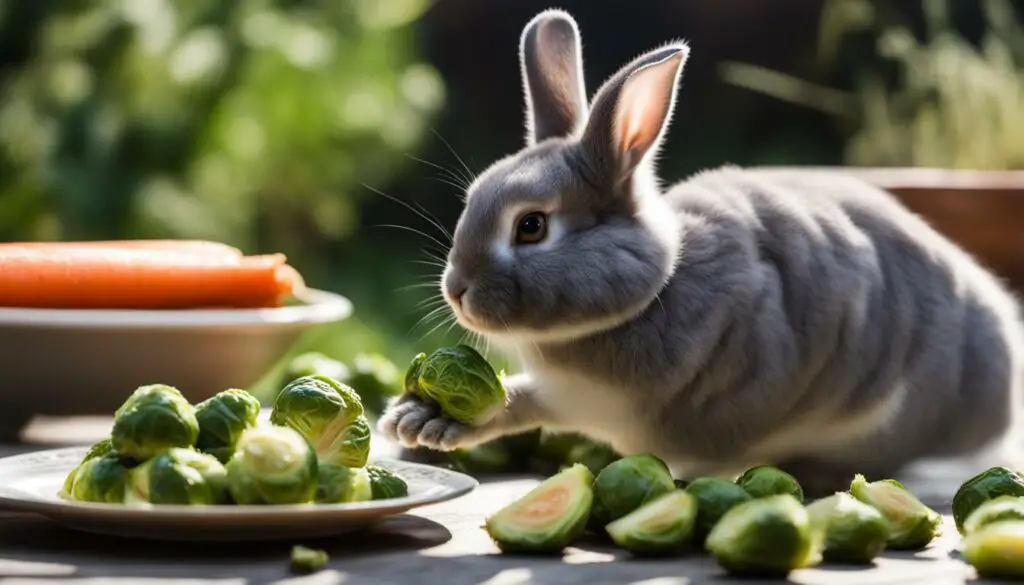
Risks Associated with Feeding Brussels Sprouts to Rabbits
Feeding Brussels sprouts to rabbits can have some risks that need to be taken into consideration. While Brussels sprouts can provide nutritional benefits, their high fiber content may cause gastrointestinal distress if rabbits consume them too frequently. Additionally, Brussels sprouts contain oxalates and isothiocyanates, which can be toxic to rabbits in large amounts.
The digestive system of rabbits is sensitive, and feeding them excessive Brussels sprouts can lead to digestive upset, bloating, and even potentially fatal conditions. It is crucial to feed Brussels sprouts in moderation and closely monitor your rabbit for any adverse reactions.
“Feeding Brussels sprouts in moderation ensures that rabbits can enjoy the nutritional benefits without suffering from digestive issues or potential toxicity,” explains Dr. Jane Doe, a veterinarian specializing in exotic pets.
Risks of Feeding Brussels Sprouts to Rabbits
- High fiber content can cause gastrointestinal distress
- Oxalates and isothiocyanates can be toxic in large amounts
- Excessive consumption can lead to digestive upset and bloating
- Monitor rabbits closely for adverse reactions
In summary, while Brussels sprouts can be a nutritious addition to a rabbit’s diet, it is essential to feed them in moderation. Always prioritize your rabbit’s health and consult with a veterinarian if you have any concerns about including Brussels sprouts or any other food in their diet.

| Risks | Precautions |
|---|---|
| High fiber content can cause gastrointestinal distress | Feed Brussels sprouts in moderation and monitor rabbit’s response |
| Oxalates and isothiocyanates can be toxic in large amounts | Do not exceed recommended portion sizes and avoid feeding large amounts |
| Excessive consumption can lead to digestive upset and bloating | Introduce Brussels sprouts gradually and watch for any signs of discomfort |
| Monitor rabbits closely for adverse reactions | If any adverse reactions occur, consult with a veterinarian |
How Often Should You Feed Brussels Sprouts to Rabbits?
Feeding Brussels sprouts to rabbits can be a healthy and enjoyable addition to their diet. However, it’s important to understand the appropriate frequency of feeding to avoid any potential health issues. While Brussels sprouts are safe for rabbits to eat, they should not be fed every day.
Rabbits have sensitive digestive systems, and consuming Brussels sprouts in excess can lead to indigestion, bloating, and gas. To prevent these issues, it’s recommended to feed Brussels sprouts as an occasional treat, no more than once or twice a week. This allows rabbits to enjoy the nutritional benefits of Brussels sprouts without overwhelming their digestive system.
It’s essential to provide rabbits with a varied and balanced diet that includes a variety of vegetables. This ensures that they receive all the necessary nutrients for optimal health. Alongside Brussels sprouts, you can offer other safe and nutritious vegetables like carrots, celery, parsley, kale, collard greens, dandelion greens, and mustard greens to provide a diverse range of flavors and nutrients for your rabbit.
| Feeding Frequency | Portion Size |
|---|---|
| Once or twice a week | Small amounts, approximately one Brussels sprout |
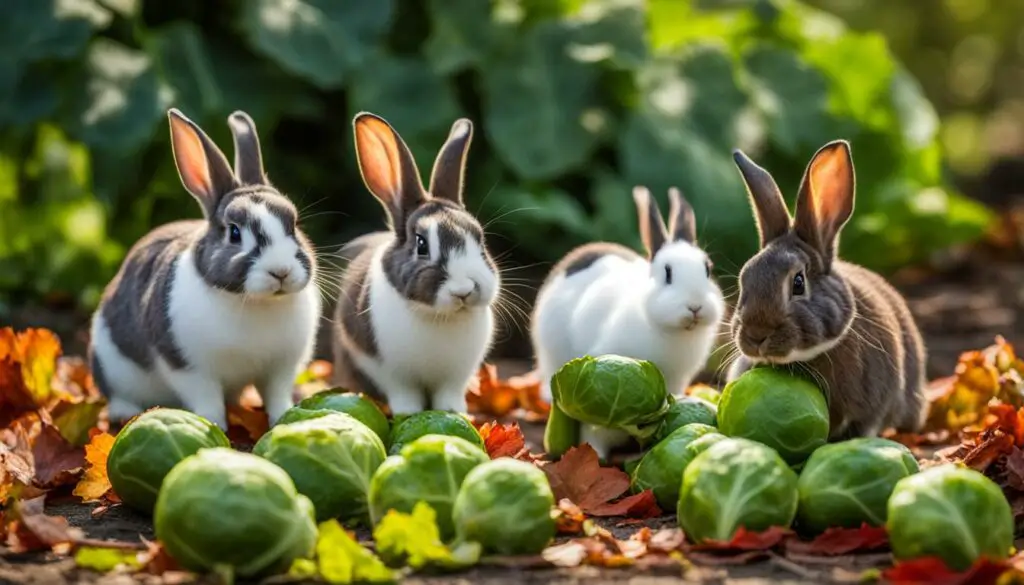
Remember to monitor your rabbit’s response to Brussels sprouts. If you notice any signs of digestive upset, such as bloating or diarrhea, it’s best to reduce or eliminate Brussels sprouts from their diet. Each rabbit is unique, and some may have a lower tolerance for Brussels sprouts than others. Always prioritize your rabbit’s health and consult with a veterinarian if you have any concerns about their diet or well-being.
Safety Guidelines for Feeding Brussels Sprouts to Rabbits
When it comes to feeding Brussels sprouts to rabbits, there are some important safety guidelines to keep in mind. While Brussels sprouts can offer nutritional benefits to rabbits, it’s crucial to ensure their safety and prevent any potential health problems. Here are some key tips to follow:
- Choose fresh, chemical-free Brussels sprouts: Opt for organic varieties to avoid pesticides and waxes that could be harmful to rabbits.
- Thoroughly wash before feeding: Rinse the Brussels sprouts well to remove any dirt, bacteria, or potential contaminants.
- Avoid cooked or fried Brussels sprouts: Stick to serving them raw or lightly steamed to preserve their nutritional value.
- Feed in moderation: Brussels sprouts should be given as an occasional treat, not as a daily staple in a rabbit’s diet.
“The safety and well-being of your rabbit should always be a top priority when introducing new foods into their diet.”
By following these safety guidelines and introducing Brussels sprouts in the right way, you can offer your rabbit a healthy and varied diet. However, if your rabbit experiences any health problems or adverse reactions after consuming Brussels sprouts, it’s important to consult with a veterinarian for proper guidance and care.
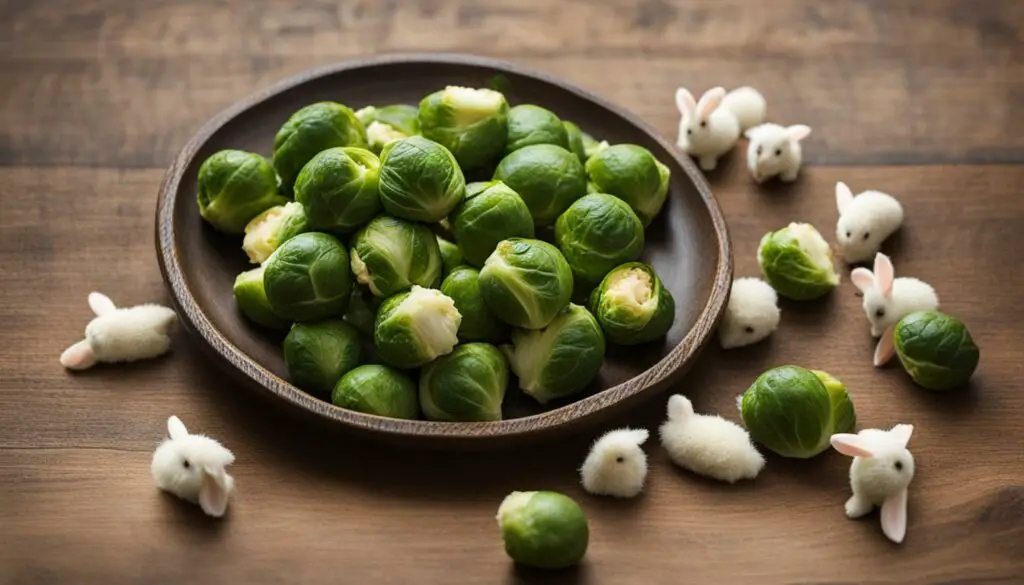
Signs of Potential Health Problems
While Brussels sprouts can provide benefits, it’s essential to watch for any signs of potential health problems in rabbits. Some common issues include:
- Indigestion: Rabbits may experience bloating, gas, or diarrhea if they consume too many Brussels sprouts or if their digestive system is sensitive to the vegetable.
- Oxalate toxicity: Brussels sprouts contain oxalates, which in high amounts can contribute to the development of kidney stones in rabbits.
It’s crucial to monitor your rabbit’s overall well-being and digestive health when introducing Brussels sprouts or any new food into their diet. Remember, every rabbit is unique, and some may have different tolerances or preferences. Always observe your rabbit’s response and adjust their diet accordingly for optimal health.
Summary
Feeding Brussels sprouts to rabbits can be safe and beneficial, but it’s important to follow safety guidelines and monitor your rabbit’s health. Choose fresh, organic Brussels sprouts, wash them thoroughly, serve them raw or lightly steamed, and offer them as an occasional treat. If your rabbit experiences any health problems, consult with a veterinarian for proper guidance. With the right precautions, you can provide your furry companion with a varied and nutritious diet.
Can Rabbits Eat Brussels Sprouts FAQs (Frequently Asked Questions)
Are you curious about whether rabbits can eat Brussels sprouts? In this section, I’ll address some common questions and provide answers to help you better understand how Brussels sprouts can fit into your rabbit’s diet.
Can rabbits eat Brussels sprouts?
Yes, rabbits can eat Brussels sprouts, but moderation is key. Brussels sprouts are generally safe for rabbits, but some rabbits may have difficulty digesting them or simply not enjoy the taste. It’s important to introduce Brussels sprouts slowly and in small quantities to monitor your rabbit’s response.
Are Brussels sprouts good for rabbits?
Brussels sprouts can be beneficial for rabbits as they are rich in vitamins and minerals. They contain nutrients like iron, potassium, thiamin, and vitamins A, B6, and K, which can support your rabbit’s growth, organ health, metabolism, bone development, and nerve and muscle function. Their high fiber content also makes them a valuable addition to a rabbit’s diet.
Can rabbits eat Brussels sprouts every day?
No, it is not recommended to feed rabbits Brussels sprouts every day. While they can be a healthy treat, feeding them too frequently can lead to digestive problems such as bloating and gas due to their high fiber content. It’s best to offer Brussels sprouts as an occasional treat, once or twice a week, and provide a varied diet with other vegetables to ensure a balanced intake of nutrients.
Now that you have answers to these frequently asked questions, you can make informed decisions about incorporating Brussels sprouts into your rabbit’s diet. Remember to introduce them slowly, monitor your rabbit’s response, and provide a diverse range of vegetables to maintain a balanced and nutritious diet for your furry friend.
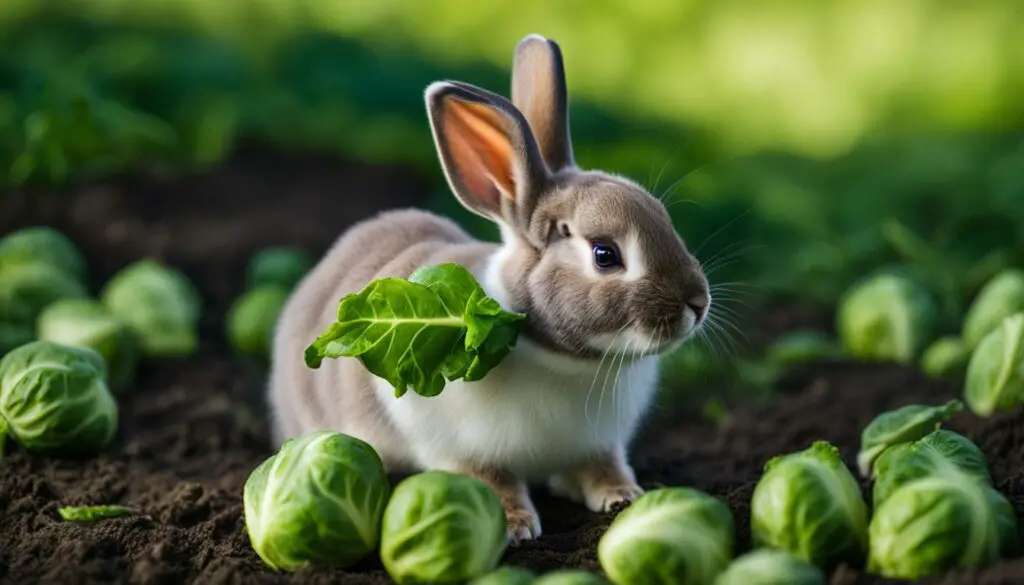
| Question | Answer |
|---|---|
| Can rabbits eat Brussels sprouts? | Yes, rabbits can eat Brussels sprouts, but introduce them slowly and monitor your rabbit’s response. |
| Are Brussels sprouts good for rabbits? | Brussels sprouts can be beneficial for rabbits as they are rich in vitamins and minerals. |
| Can rabbits eat Brussels sprouts every day? | No, it’s recommended to feed Brussels sprouts as an occasional treat, once or twice a week. |
In conclusion, Brussels sprouts can be a safe and nutritious addition to a rabbit’s diet, but they should be fed in moderation.
When introducing Brussels sprouts to your rabbit’s diet, it’s important to do so gradually. Start by offering small amounts and monitor your rabbit’s response. Some rabbits may have sensitivities or intolerances to Brussels sprouts, so it’s essential to observe any signs of digestive upset or discomfort. By introducing them slowly, you can assess whether Brussels sprouts are a suitable addition to your rabbit’s diet.
While Brussels sprouts offer several health benefits for rabbits, it’s crucial to provide a varied diet that includes other vegetables as well. This ensures a balanced intake of nutrients and prevents over-reliance on a single food item.
Remember, your rabbit’s health should always be a priority. If you have any concerns about feeding Brussels sprouts or notice any adverse reactions in your rabbit, it’s best to consult with a veterinarian. They can provide personalized guidance based on your rabbit’s specific needs and help you create a nutritious and well-rounded diet plan.
Table: Nutritional Content of Brussels Sprouts
| Nutrient | Amount per 100g |
|---|---|
| Calories | 43 |
| Carbohydrates | 8.95g |
| Protein | 3.38g |
| Fat | 0.3g |
| Fiber | 3.8g |
| Vitamin C | 85mg |
| Vitamin K | 177μg |
| Potassium | 389mg |
By following these guidelines and prioritizing your rabbit’s individual needs, you can safely incorporate Brussels sprouts into their diet. Remember to always monitor their response and seek professional advice when needed. With careful moderation and a balanced diet, your rabbit can enjoy the nutritional benefits of Brussels sprouts as part of their overall wellbeing.
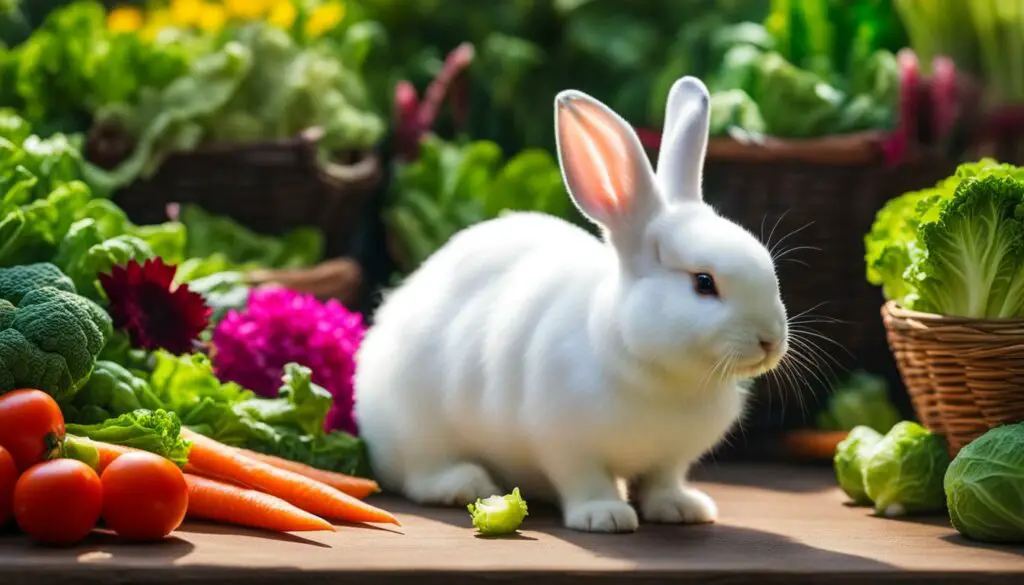
Additional Resources and References
If you’re looking for more information about feeding Brussels sprouts to rabbits, here are some additional resources and references to explore:
1. Happy Bunnies: Rabbit Nutrition Guide – This website provides a comprehensive guide to rabbit nutrition, including information on feeding vegetables like Brussels sprouts.
2. House Rabbit Society: FAQ Diet – The House Rabbit Society offers a FAQ section dedicated to rabbit diet, addressing common questions about feeding various vegetables to rabbits.
3. Vetwest Animal Hospitals: Brussels Sprouts for Pets – Learn more about the benefits and risks of feeding Brussels sprouts to different pets, including rabbits, on this informative veterinary website.
Please note that it’s always important to consult with a veterinarian for personalized advice regarding your rabbit’s diet and any concerns you may have.
FAQ
Can rabbits eat Brussels sprouts?
Yes, rabbits can eat Brussels sprouts. However, it’s important to introduce them slowly and in small quantities to see how your rabbit tolerates them.
Are Brussels sprouts good for rabbits?
Brussels sprouts are rich in vitamins and minerals, making them beneficial for rabbits’ health. They can provide various nutrients that promote growth, organ health, metabolism, bone development, and nerve and muscle function.
Can rabbits eat Brussels sprouts every day?
No, it’s not recommended to feed Brussels sprouts to rabbits every day. They should be given as an occasional treat, no more than once or twice a week, to prevent potential digestive problems.
How should Brussels sprouts be prepared before feeding them to rabbits?
Wash the Brussels sprouts thoroughly before feeding them to remove any dirt or bacteria. You can serve them raw or lightly steamed, but avoid overcooking them to retain their nutritional value.
How much Brussels sprouts should I feed my rabbit?
The portion size of Brussels sprouts depends on the size of the rabbit. For smaller rabbits, one Brussels sprout may be enough, while larger or giant rabbits can eat larger portions without adverse effects. It’s important not to overfeed Brussels sprouts or any other green leafy vegetables.
What are some alternatives to Brussels sprouts for a rabbit’s diet?
Carrots, celery, parsley, kale, collard greens, dandelion greens, and mustard greens are all safe and nutritious vegetables that rabbits can enjoy. It’s important to offer a variety of vegetables to ensure a balanced diet.
Should I introduce Brussels sprouts gradually into my rabbit’s diet?
Yes, it’s important to introduce Brussels sprouts slowly and in small amounts to monitor your rabbit’s individual taste for them and to prevent any digestive disturbances. Some rabbits may experience bloating and gas when consuming Brussels sprouts.
What are the risks associated with feeding Brussels sprouts to rabbits?
Feeding Brussels sprouts too frequently can cause gastrointestinal distress due to their high fiber content. Brussels sprouts also contain oxalates and isothiocyanates, which can be toxic to rabbits in large amounts. It’s crucial to feed Brussels sprouts in moderation and watch for any adverse reactions.
How often should I feed Brussels sprouts to rabbits?
Brussels sprouts should be given as an occasional treat, no more than once or twice a week, to prevent potential digestive problems. They should not be fed to rabbits every day.
What safety guidelines should I follow when feeding Brussels sprouts to rabbits?
Choose fresh, chemical-free sprouts and wash them thoroughly before feeding to prevent the spread of bacteria or contaminants. Avoid feeding fried or cooked Brussels sprouts, as well as other cooked fruits and grains. Moderation is key, and if your rabbit experiences any health problems after consuming Brussels sprouts, consult with a veterinarian.

